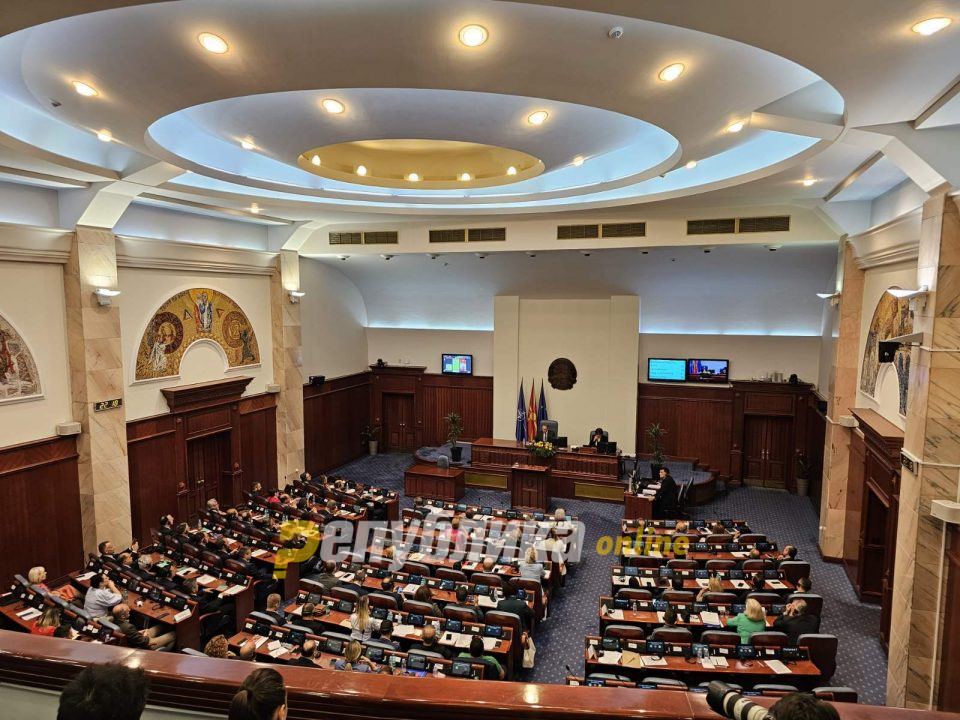Today, with 65 votes “for”, the Parliament passed the Law on borrowing with a loan of half a billion euros from the Hungarian Government, following a shortened procedure.
During the general investigation on the law of the continuation of the 14th session, the opposition accused that the loan agreement was made behind closed doors, with extremely dubious intentions and brings enormous political and economic consequences with an enormous increase in the public debt. Contrary to them, VMRO-DPMNE said that the procedure is transparent and that for the first time there is a loan for which it is known in advance what it will be spent on and that it will help the municipalities and the economy.
The loan of the Hungarian Export-Import Bank, a private limited liability company, will be withdrawn in one tranche, the repayment term is 15 years, including a grace period of three years, and the interest rate is fixed at 3.25 percent. It will be repaid in 24 semi-annual installments, on February 15 and August 15 of each year.
Deputy Minister of Finance Nikolce Jankulovski explained the conditions for the loan and indicated that the state will pay the Hungarian Export Import Bank a commission for any undrawn financial assets in the amount of 0.5 percent of the loan, on an annual basis.
After the passing of the law and the signing of the decree by the president, we plan to sign the contract immediately and these commissions will not be paid on this basis, said Jankulovski.
As he added, the state will pay a commission for rendered legal services to an independent firm selected by the Hungarian Export-Import Bank before withdrawing the tranche.
From what we know, that commission will amount to about 70 thousand euros, and compared to the Eurobond that we issued in 2023, we paid 880 thousand euros for the same amount of loan, and in 2021, one million and 200 thousand euros, stated the deputy the finance minister.
The purpose of securing the loan, Jnakulovski pointed out, is to help the country have a sustainable external financial situation, while encouraging economic adjustments and structural reforms.
The MP from the opposition SDSM, Fatmir Bitici, pointed out that the state will be a debtor and pay commissions to a company that it will not choose on its own.
In this case, in addition to the commission of 0.5 percent, we also receive hidden costs for legal services, which essentially have nothing to do with the Macedonian institutions. There are hidden costs that we hear little or never read about. It is not stated anywhere the amount of the hidden costs of the chosen consulting company, so only the government knows the fictitious 70 thousand euros and maybe 700 thousand, or 7 million, but soon we will see in open finances, Bitici said.
According to him, this loan leaves room for political manipulation and corruption, and foreign lenders may set conditions that will be unfavorable for our country and will affect our internal and external policies.
The Hungarian bank has a history of financing projects that deviate from the Western European value corpus. The question arises whether the same thing will happen in our country and whether we will be forced to make political concessions for this loan, whether we will be influenced by foreign policy agendas that are not in accordance with the democratic values of our society, Bitici said.
This, he considered, is a potential trap that can put the state on the path of political subordination and economic dependence on regimes whose interests are not aligned with the interests of our citizens and democratic ideals.
This borrowing carries a huge risk for the economic stability of the country, future generations will pay the bills, and citizens will face increased taxes and inflation and reduced purchasing power. This is not the way to economic development, Bitici said.
Most worrying, he said, is “the lack of transparency and the speed with which this borrowing has been announced and is already being implemented without any institutional control and public oversight.”
How is it possible that only five days after the formation of the new Government on June 23, 20204, the Hungarian bank submitted a letter of intent for a loan of half a billion euros. Even more frightening is the fact that the negotiations started with a foreign government while VMRO-DPMNE was the opposition. How, why and according to which rules. This is an Agreement made behind closed doors that brings huge political and economic consequences for all of us, said Bitici.
According to him, the explanation of the need for the law by a member of parliament and not by the Minister of Finance raises big questions about whether this decision is really in line with the economic interests of the citizens. – Does the absence of the finance minister mean a disagreement or, even worse, a reluctance to take responsibility for this decision and its consequences, Bitici asked.
Accusing that the process was conducted in secret, he also asked “whether the Government is afraid of the reaction of the citizens if the truth comes out and why this loan was not announced during the pre-elections, because, as he said, they probably feared that





Comments are closed for this post.